
Blonde on Blonde is the seventh studio album by American singer-songwriter Bob Dylan, released as a double album on June 20, 1966, by Columbia Records. Recording sessions began in New York in October 1965 with numerous backing musicians, including members of Dylan's live backing band, the Hawks. Though sessions continued until January 1966, they yielded only one track that made it onto the final album—"One of Us Must Know ". At producer Bob Johnston's suggestion, Dylan, keyboardist Al Kooper, and guitarist Robbie Robertson moved to the CBS studios in Nashville, Tennessee. These sessions, augmented by some of Nashville's top session musicians, were more fruitful, and in February and March all the remaining songs for the album were recorded.
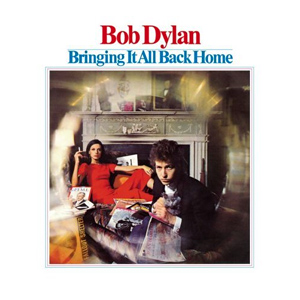
Bringing It All Back Home is the fifth studio album by American singer-songwriter Bob Dylan. It was released in April 1965, by Columbia Records.
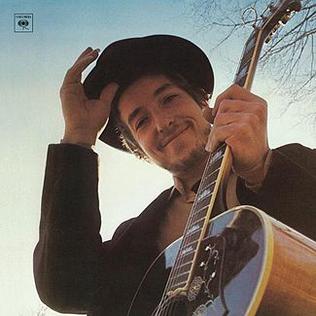
Nashville Skyline is the ninth studio album by American singer-songwriter Bob Dylan, released on April 9, 1969, by Columbia Records as LP record, reel to reel tape and audio cassette.

Pat Garrett & Billy the Kid is the twelfth studio album and first soundtrack album by American singer-songwriter Bob Dylan, released on July 13, 1973, by Columbia Records for the Sam Peckinpah film, Pat Garrett and Billy the Kid. Dylan himself appeared in the film as the character "Alias". The soundtrack consists mainly of instrumental music and was inspired by the movie itself. The album includes "Knockin' on Heaven's Door", which became a trans-Atlantic Top 20 hit.
"4th Time Around" is a song by American singer-songwriter Bob Dylan, which was released as the 12th track on his seventh studio album Blonde on Blonde on June 20, 1966. The song was written by Dylan and produced by Bob Johnston. Commentators often interpret it as a parody of the Beatles' 1965 song "Norwegian Wood ". John Lennon composed "Norwegian Wood" after being influenced by the introspective lyrics of Dylan. Lennon later reflected on his feelings of paranoia when Dylan first played him "4th Time Around".

Charles Ray McCoy is a Grammy-winning American session musician, harmonica player, and multi-instrumentalist. In 2009, he was inducted into the Country Music Hall of Fame. Based in Nashville, McCoy's playing is heard on recordings by Elvis Presley, Bob Dylan, Johnny Cash, Chet Atkins, Waylon Jennings, Leon Russell, and Loretta Lynn. He has recorded thirty-seven studio albums, including fourteen for Monument Records. Thirteen of his singles have entered the Billboard country charts. He was a member of Area Code 615 and Barefoot Jerry. In 2007, McCoy was inducted into the International Musicians Hall of Fame as a part a group of session musicians dubbed "The Nashville A-Team". In 2022, he was invited to become a member of the Grand Ole Opry.
"Sad Eyed Lady of the Lowlands" is a song by American singer-singwriter Bob Dylan. First released as the closing track on Dylan's 1966 album Blonde on Blonde, the song lasts 11 minutes and 22 seconds, occupying the entire side four of the double album. The song was written by Dylan and produced by Bob Johnston. Dylan has revealed that the song was written about his wife, Sara Lownds.

"Lay Lady Lay", sometimes rendered "Lay, Lady, Lay", is a song written by Bob Dylan and originally released in 1969 on his Nashville Skyline album. Like many of the tracks on the album, Dylan sings the song in a low croon, rather than in the high nasal singing style associated with his earlier recordings. The song has become a standard and has been covered by numerous bands and artists over the years.
"Absolutely Sweet Marie" is a song by American singer-songwriter Bob Dylan, which was released on the third side of the double album and Dylan's seventh studio album, Blonde on Blonde (1966). The song was written by Dylan and produced by Bob Johnston. It was recorded at around 1:00 am on March 8, 1966, at Columbia Studio B, Nashville. Some commentators have interpreted the song as being about sexual frustration.
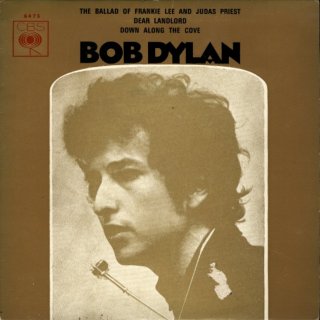
"The Ballad of Frankie Lee and Judas Priest" is a song by American singer-songwriter Bob Dylan which was released as the fifth track on his eighth studio album John Wesley Harding (1967). The track was written by Dylan and produced by Bob Johnston. It was recorded in one take on October 17, 1967, at Columbia Studio A in Nashville. The song's lyrics refer to two friends, Frankie Lee and Judas Priest. Lee asks Priest for a loan of money. Priest offers the money freely. Lee spends it in a brothel over 16 days, then dies of thirst in Priest's arms. It has been suggested by commentators that the song refers to Dylan's relationship with his manager Albert Grossman or to his contractual negotiations with his record company. The song received a largely negative critical reception.
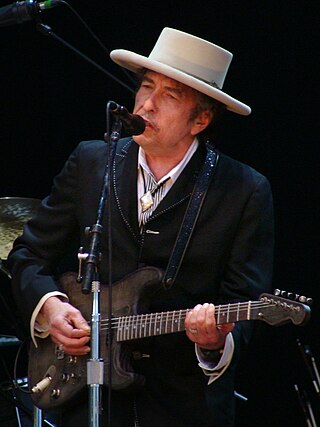
Bob Dylan is an American singer-songwriter. Often regarded as one of the greatest songwriters of all time, Dylan has been a major figure in popular culture during a career spanning more than 60 years. Much of his most celebrated work dates from the 1960s, when songs such as "Blowin' in the Wind" (1963) and "The Times They Are a-Changin'" (1964) became anthems for the civil rights and antiwar movements. His lyrics during this period incorporated a range of political, social, philosophical, and literary influences, defying pop music conventions and appealing to the burgeoning counterculture.

"Just Like a Woman" is a song by American singer-songwriter Bob Dylan first released on his seventh studio album, Blonde on Blonde on June 20, 1966. It was written by Dylan and produced by Bob Johnston. A shorter edit was released as a single in the United States during August 1966 and peaked at number 33 on the Billboard Hot 100. The song has been criticized for supposed sexism or misogyny in its lyrics, and has received a mixed critical reaction; some critics have suggested that the song was inspired by Edie Sedgwick, while other consider that it refers to Dylan's relationship with fellow folk singer Joan Baez.

"Rainy Day Women #12 & 35" is a song written and recorded by American singer-songwriter Bob Dylan. Columbia Records first released an edited version as a single in March 1966, which reached numbers two and seven in the US and UK charts respectively. A longer version appears as the opening track of Dylan's seventh studio album, Blonde on Blonde (1966), and has been included on several compilation albums.
"She Belongs to Me" is a song by Bob Dylan, and was first released as the second track on his 1965 album Bringing It All Back Home. The song may be about a former girlfriend, Suze Rotolo, or fellow folk singer Joan Baez, contemporary siren Nico, or Sara Lownds, the woman that Dylan would wed in November 1965.
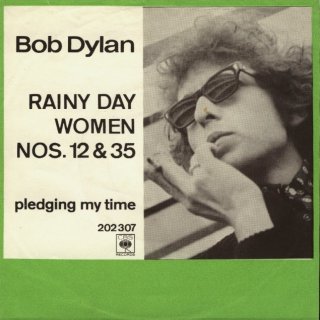
"Pledging My Time" is a blues song by American singer-songwriter Bob Dylan from his seventh studio album, Blonde on Blonde (1966). The song, written by Dylan and produced by Bob Johnston, was recorded on March 8, 1966 in Nashville, Tennessee. Dylan is featured on lead vocals, harmonica, and guitar, backed by guitarist Robbie Robertson and an ensemble of veteran Nashville session men.
"Girl from the North Country" is a song written by Bob Dylan. It was recorded at Columbia Recording Studios in New York City in April 1963, and released the following month as the second track on Dylan's second studio album, The Freewheelin' Bob Dylan. Dylan re-recorded the song as a duet with Johnny Cash in February 1969. That recording became the opening track on Nashville Skyline, Dylan's ninth studio album.

The Bootleg Series Vol. 9: The Witmark Demos: 1962–1964 is a compilation album by American singer-songwriter Bob Dylan, containing demo recordings he made for his first two publishing companies, Leeds Music and M. Witmark & Sons, from 1962 to 1964. The seventh installment of the ongoing Bob Dylan Bootleg Series, it was released on October 19, 2010 on Legacy Records.

"Obviously 5 Believers" is a song by American singer-songwriter Bob Dylan, which was released as the last track of side three of his double album Blonde on Blonde (1966), and was the B-side to the single release of "Just Like a Woman" for releases in America and some other countries. The song was written by Dylan and produced by Bob Johnston. It was recorded at Columbia Music Row Studios, in the early morning hours of a 9–10 March 1966 session. Four takes were recorded, although the first two were incomplete. It has been interpreted as a blues song about loneliness, with critics noting similarities in melody and structure to Memphis Minnie's "Chauffeur Blues". Dylan's vocals and the musicianship of the band on the track have both received critical acclaim, although the track is regarded by leading commentators as one of the minor songs on Blonde on Blonde.
"Temporary Like Achilles" is a blues song by American singer-songwriter Bob Dylan. It was released as the second track of side three of his double album Blonde on Blonde on June 20, 1966. The song was written by Dylan, and produced by Bob Johnston. It was recorded at Columbia Music Row Studios, Nashville on March 9, 1966. The song incorporated elements of Dylan's incomplete "Medicine Sunday", which he had recorded with members of the Band in New York in October 1965. The song describes a narrator's frustration at being kept wating by a woman that he wishes to be romantically involved with; she is guarded by "Achilles". Some critics have suggested that the song references the Iliad.
"Highway 51 Blues" is a song composed by American blues pianist Curtis Jones, released on a 78 record on January 12, 1938. Bob Dylan's track "Highway 51", released as the closing track of his debut album Bob Dylan on March 19, 1962, incorporated the tune from Jones's version.












